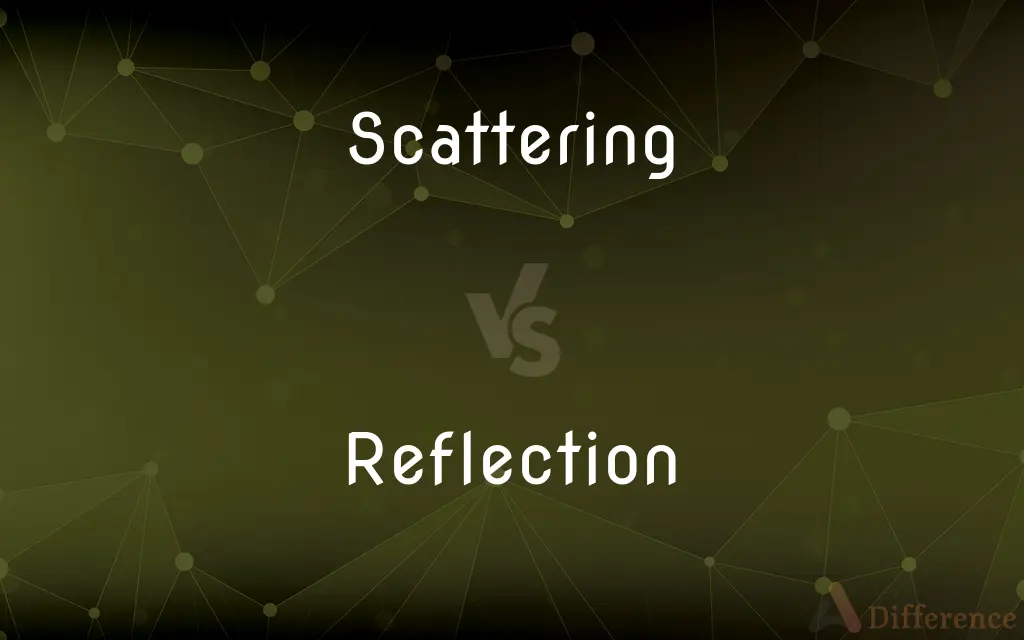Scattering vs. Reflection — What's the Difference?
Edited by Tayyaba Rehman — By Maham Liaqat — Updated on April 3, 2024
Scattering involves the dispersion of waves or particles in various directions, while reflection is the bouncing back of waves or particles from a surface.

Difference Between Scattering and Reflection
Table of Contents
ADVERTISEMENT
Key Differences
Scattering occurs when light or other waves encounter particles, irregularities, or imperfections in a medium, causing the waves to spread out or disperse in different directions. This process can affect the direction, energy, and sometimes the wavelength of the incoming waves. On the other hand, reflection involves the change in direction of a wavefront at an interface between two different media so that the wavefront returns into the medium from which it originated. This process typically follows the law of reflection, where the angle of incidence is equal to the angle of reflection.
In scattering, the dispersed waves may continue to interact with other particles or obstacles, leading to further scattering events. This can result in a diffused distribution of energy, often causing a dilution of the wave's intensity and changes in its original direction. Whereas, in reflection, the wave retains its energy but changes direction according to the reflective surface's orientation. The reflected wave remains coherent and maintains the integrity of its waveform, especially in specular (mirror-like) reflection.
Scattering can lead to phenomena such as the blue color of the sky, which results from the scattering of sunlight by the atmosphere's molecules. This is an example of Rayleigh scattering, which is more effective at shorter wavelengths. In contrast, reflection is observed when light bounces off surfaces like mirrors, water bodies, or polished metal, where the incident and reflected rays are predictable and follow specific geometric laws.
The mechanisms underlying scattering and reflection are different. Scattering involves complex interactions with particles and is influenced by the size of the particles relative to the wavelength of the incoming wave. Reflection, however, is governed by the physical and chemical properties of the reflecting surface, such as smoothness, electrical conductivity, and material composition.
While scattering can result in a loss of intensity and potentially a change in wavelength (as in Raman scattering), reflection is characterized by minimal energy loss, with the incident and reflected waves having the same wavelength, provided the reflecting surface is ideal and does not absorb the wave.
ADVERTISEMENT
Comparison Chart
Definition
Dispersion of waves in various directions
Bouncing back of waves from a surface
Principle
Interaction with particles or irregularities
Angle of incidence equals angle of reflection
Resulting Phenomena
Blue sky, color of clouds
Mirror images, echo
Energy and Wavelength
Possible change in energy and wavelength
Energy and wavelength generally conserved
Dependence
Size of particles, wavelength
Surface properties, angle of incidence
Compare with Definitions
Scattering
Dispersion of light by small particles.
The scattering of sunlight by atmospheric particles creates a blue sky.
Reflection
Bouncing back of light from a surface.
The reflection of the sun on the water created a dazzling effect.
Scattering
Process causing waves to spread in multiple directions.
Scattering in a foggy environment reduces visibility.
Reflection
Mirror-like return of waves to the medium.
The reflection of sound in a canyon produces an echo.
Scattering
Phenomenon altering the path and properties of waves.
In optical fibers, scattering affects signal quality.
Reflection
The return of electromagnetic waves from surfaces.
The moon's surface causes the reflection of sunlight to Earth.
Scattering
Interaction with matter that redistributes energy.
Neutron scattering helps scientists understand material structures.
Reflection
Preservation of wave energy upon bouncing back.
The reflection of laser light is used in precision measurements.
Scattering
Diverse redirection of waves or particles.
Scattering of light by a prism reveals the spectrum of colors.
Reflection
Process following the law of reflection.
Perfect reflection on a calm lake creates clear images.
Scattering
Scattering is a term used in physics to describe a wide range of physical processes where moving particles or radiation of some form, such as light or sound, are forced to deviate from a straight trajectory by localized non-uniformities (including particles and radiation) in the medium through which they pass. In conventional use, this also includes deviation of reflected radiation from the angle predicted by the law of reflection.
Reflection
The act of reflecting or the state of being reflected.
Scattering
Something scattered, especially a small, irregularly occurring amount or quantity
A scattering of applause.
Reflection
Something, such as light, radiant heat, sound, or an image, that is reflected.
Scattering
(Physics) The dispersal of a beam of particles or of radiation into a range of directions as a result of physical interactions.
Reflection
Serious thinking or careful consideration
Engaged in reflection on the problem.
Scattering
Placed irregularly and far apart; scattered.
Reflection
A thought or an opinion resulting from such thinking or consideration
Wrote down her reflections.
Scattering
A small quantity of something occurring at irregular intervals and dispersed at random points.
There will be a scattering of showers, with heavy rain in places.
Reflection
An indirect expression of censure or discredit
A reflection on his integrity.
Scattering
(elections) The total number of votes awarded to nonmajor or unlisted candidates.
Reflection
A manifestation or result
Her achievements are a reflection of her courage.
Scattering
(physics) The process whereby a beam of waves or particles is dispersed by collisions or similar interactions.
Reflection
The folding of a membrane from the wall of a cavity over an organ and back to the wall.
Scattering
Going or falling in various directions; not united or aggregated; divided among many; as, scattering votes.
Reflection
The folds so made.
Scattering
Act of strewing about; something scattered.
Reflection
The act of reflecting or the state of being reflected.
Scattering
The physical process in which particles are deflected haphazardly as a result of collisions
Reflection
The property of a propagated wave being thrown back from a surface (such as a mirror).
Scattering
A small number dispersed haphazardly;
The first scatterings of green
Reflection
Something, such as an image, that is reflected.
The dog barked at his own reflection in the mirror.
Scattering
A light shower that falls in some locations and not others nearby
Reflection
Careful thought or consideration.
After careful reflection, I have decided not to vote for that proposition.
Scattering
Spreading widely or driving off
Reflection
An implied criticism.
It is a reflection on his character that he never came back to see them.
Scattering
The act of scattering
Reflection
(computing) The process or mechanism of determining the capabilities of an object at run-time.
Scattering
Spreading by diffusion
Reflection
(anatomy) The folding of a part; a fold.
Reflection
The act of reflecting, or turning or sending back, or the state of being reflected.
The eye sees not itself,But by reflection, by some other things.
Reflection
The reverting of the mind to that which has already occupied it; continued consideration; meditation; contemplation; hence, also, that operation or power of the mind by which it is conscious of its own acts or states; the capacity for judging rationally, especially in view of a moral rule or standard.
By reflection, . . . I would be understood to mean, that notice which the mind takes of its own operations, and the manner of them, by reason whereof there come to be ideas of these operations in the understanding.
This delight grows and improves under thought and reflection.
Reflection
Shining; brightness, as of the sun.
Reflection
That which is produced by reflection.
As the sun water we can bear,Yet not the sun, but his reflection, there.
Reflection
A part reflected, or turned back, at an angle; as, the reflection of a membrane.
Job's reflections on his once flourishing estate did at the same time afflict and encourage him.
Reflection
Censure; reproach cast.
He died; and oh! may no reflection shedIts poisonous venom on the royal dead.
Reflection
The transference of an excitement from one nerve fiber to another by means of the nerve cells, as in reflex action. See Reflex action, under Reflex.
Reflection
A calm lengthy intent consideration
Reflection
The phenomenon of a propagating wave (light or sound) being thrown back from a surface
Reflection
Expression without words;
Tears are an expression of grief
The pulse is a reflection of the heart's condition
Reflection
The image of something as reflected by a mirror (or other reflective material);
He studied his reflection in the mirror
Reflection
A likeness in which left and right are reversed
Reflection
(mathematics) a transformation in which the direction of one axis is reversed
Reflection
A remark expressing careful consideration
Reflection
The ability to reflect beams or rays
Common Curiosities
Can scattering change the color of light?
Yes, scattering can change the apparent color of light, as seen in the blue sky.
Is reflection always clear and mirror-like?
Reflection is clear in specular reflection but can be diffused in rough surfaces, leading to diffuse reflection.
Is the sky blue due to reflection or scattering?
The sky is blue primarily due to the scattering of sunlight by atmospheric molecules.
Can scattering occur without a change in wavelength?
Yes, scattering can occur without a change in wavelength, although some types, like Raman scattering, do involve wavelength shifts.
How does surface roughness affect reflection?
Surface roughness can diffuse the reflected waves, leading to diffuse reflection rather than specular reflection.
Do both scattering and reflection follow the same laws?
No, they follow different principles; scattering is influenced by particle interactions, while reflection follows the law of reflection.
Can materials both scatter and reflect light?
Yes, many materials can both scatter and reflect light depending on their properties and the light's wavelength.
Does reflection contribute to the greenhouse effect?
Indirectly, by reflecting light back to the atmosphere, surfaces can contribute to trapping heat, affecting the greenhouse effect.
How does polarization affect reflection and scattering?
Polarization can significantly affect the direction and intensity of both reflected and scattered light.
What is the main difference between scattering and reflection?
Scattering disperses waves in various directions, while reflection involves waves bouncing back from a surface.
Is all reflected light visible?
Not all reflected light is visible; it depends on the wavelength of the light and the observer's perception.
Why is scattering important in medical imaging?
Scattering provides information about tissue structure and composition in techniques like ultrasound and MRI.
Can scattering be controlled or minimized?
Yes, through material selection and engineering, scattering can be minimized, especially in optical devices.
Why do clouds appear white if scattering affects color?
Clouds appear white due to the scattering of all visible light wavelengths equally by the water droplets.
Can the angle of incidence affect scattering?
Yes, but its effect is more complex and less predictable than in reflection.
Share Your Discovery

Previous Comparison
Luxury vs. Prestige
Next Comparison
Require vs. MandatoryAuthor Spotlight
Written by
Maham LiaqatEdited by
Tayyaba RehmanTayyaba Rehman is a distinguished writer, currently serving as a primary contributor to askdifference.com. As a researcher in semantics and etymology, Tayyaba's passion for the complexity of languages and their distinctions has found a perfect home on the platform. Tayyaba delves into the intricacies of language, distinguishing between commonly confused words and phrases, thereby providing clarity for readers worldwide.















































